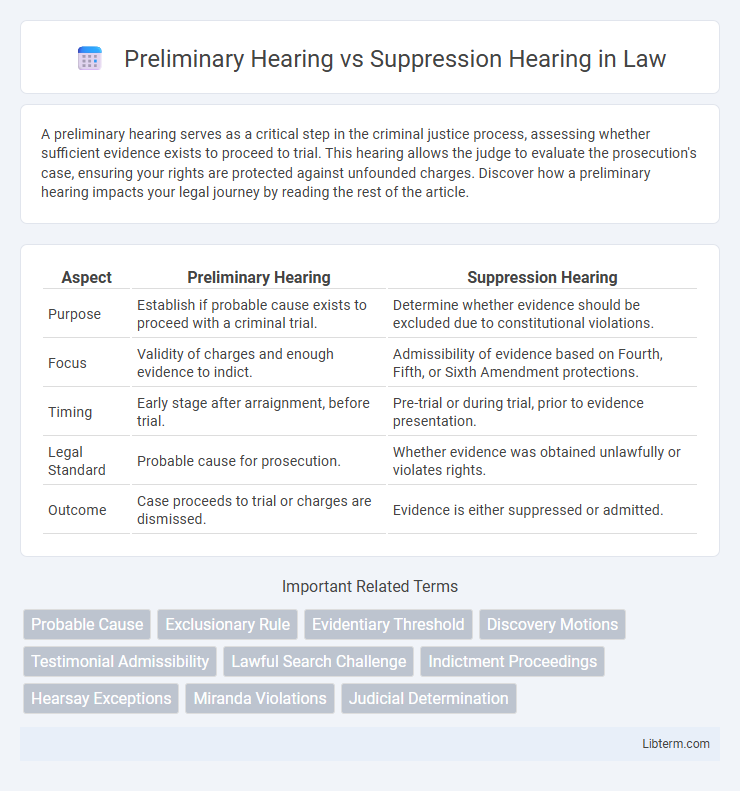A preliminary hearing serves as a critical step in the criminal justice process, assessing whether sufficient evidence exists to proceed to trial. This hearing allows the judge to evaluate the prosecution's case, ensuring your rights are protected against unfounded charges. Discover how a preliminary hearing impacts your legal journey by reading the rest of the article.
Table of Comparison
| Aspect | Preliminary Hearing | Suppression Hearing |
|---|---|---|
| Purpose | Establish if probable cause exists to proceed with a criminal trial. | Determine whether evidence should be excluded due to constitutional violations. |
| Focus | Validity of charges and enough evidence to indict. | Admissibility of evidence based on Fourth, Fifth, or Sixth Amendment protections. |
| Timing | Early stage after arraignment, before trial. | Pre-trial or during trial, prior to evidence presentation. |
| Legal Standard | Probable cause for prosecution. | Whether evidence was obtained unlawfully or violates rights. |
| Outcome | Case proceeds to trial or charges are dismissed. | Evidence is either suppressed or admitted. |
Understanding Preliminary Hearings
Preliminary hearings serve as a crucial step in the criminal justice process, where a judge evaluates whether sufficient evidence exists to proceed to trial, ensuring probable cause is established. This hearing involves the prosecution presenting key evidence and witnesses, enabling the defense to challenge the validity of the charges before a full trial. Unlike suppression hearings focused on excluding unlawfully obtained evidence, preliminary hearings determine if the case should move forward based on the strength of the prosecution's evidence.
Purpose of a Preliminary Hearing
A Preliminary Hearing aims to determine if there is sufficient evidence to proceed with criminal charges by evaluating whether probable cause exists. This hearing protects defendants from unfounded prosecutions by requiring prosecutors to present evidence before a trial. Unlike a Suppression Hearing, which focuses on the admissibility of evidence, the Preliminary Hearing centers on establishing the validity of the charged offense.
Key Procedures in Preliminary Hearings
Preliminary hearings involve the court determining whether sufficient evidence exists to proceed with criminal charges, where the prosecution must present probable cause through witness testimonies and physical evidence. Defense attorneys may cross-examine witnesses to challenge the prosecution's case and raise issues regarding the credibility of evidence. Unlike suppression hearings, which focus on excluding illegally obtained evidence, preliminary hearings primarily assess the legality and strength of the charges before trial.
What Is a Suppression Hearing?
A suppression hearing is a pretrial legal proceeding where a defendant challenges the admissibility of evidence obtained in violation of constitutional rights, often focusing on unlawful searches or seizures under the Fourth Amendment. The judge determines whether the evidence should be excluded from trial to protect against violations of due process. This differs from a preliminary hearing, which assesses whether there is enough evidence to proceed with a criminal trial.
Legal Purpose of Suppression Hearings
Suppression hearings serve the legal purpose of determining whether evidence obtained in violation of a defendant's constitutional rights should be excluded from trial, ensuring the protection of Fourth Amendment rights against unlawful searches and seizures. Unlike preliminary hearings that assess if probable cause exists to proceed to trial, suppression hearings focus on the admissibility of specific evidence based on legality and procedural compliance. Courts rely on suppression hearings to prevent illegally obtained evidence from prejudicing the jury and uphold the integrity of the judicial process.
Key Differences: Preliminary vs Suppression Hearings
Preliminary hearings determine if there is enough evidence to proceed to trial, focusing on probable cause, while suppression hearings evaluate the admissibility of evidence based on constitutional violations. During a preliminary hearing, the judge reviews evidence and witness testimonies to decide if the case should continue, whereas a suppression hearing examines whether evidence was obtained legally, impacting its exclusion or inclusion in trial. The key difference lies in their purpose: preliminary hearings address the validity of charges, and suppression hearings protect defendants' rights by scrutinizing evidence legality.
Rights of the Defendant in Both Hearings
A Preliminary Hearing allows the defendant to challenge the prosecution's evidence to establish probable cause, ensuring the right to a fair trial by preventing baseless charges from proceeding. In a Suppression Hearing, the defendant asserts their Fourth Amendment rights by seeking to exclude illegally obtained evidence, protecting against unlawful searches and seizures. Both hearings safeguard the defendant's constitutional rights by providing crucial opportunities to contest the prosecution's case before trial.
Legal Standards Applied in Each Hearing
Preliminary hearings require the prosecution to demonstrate probable cause that a crime was committed and the defendant committed it, serving as a safeguard against unwarranted prosecutions. Suppression hearings focus on whether evidence was obtained in violation of constitutional rights, primarily assessing the admissibility of evidence under Fourth, Fifth, and Sixth Amendment standards. The burden of proof in suppression hearings often lies with the defense to establish that evidence was unlawfully seized or obtained.
Outcomes and Implications for the Case
A preliminary hearing determines whether sufficient evidence exists to proceed to trial, potentially resulting in case dismissal or formal charges. A suppression hearing evaluates the admissibility of evidence, often impacting the prosecution's ability to prove guilt by excluding illegally obtained or prejudicial evidence. Outcomes of both hearings significantly influence case strategy, plea negotiations, and overall trial prospects.
Strategic Importance in Criminal Defense
Preliminary hearings verify if sufficient evidence exists to proceed to trial, allowing defense attorneys to evaluate the prosecution's case and identify weaknesses early on. Suppression hearings focus on excluding unlawfully obtained evidence, which can critically weaken the prosecution's position and potentially lead to case dismissal. Both hearings provide strategic opportunities to challenge the prosecution, shape trial preparation, and safeguard defendants' constitutional rights.
Preliminary Hearing Infographic

 libterm.com
libterm.com